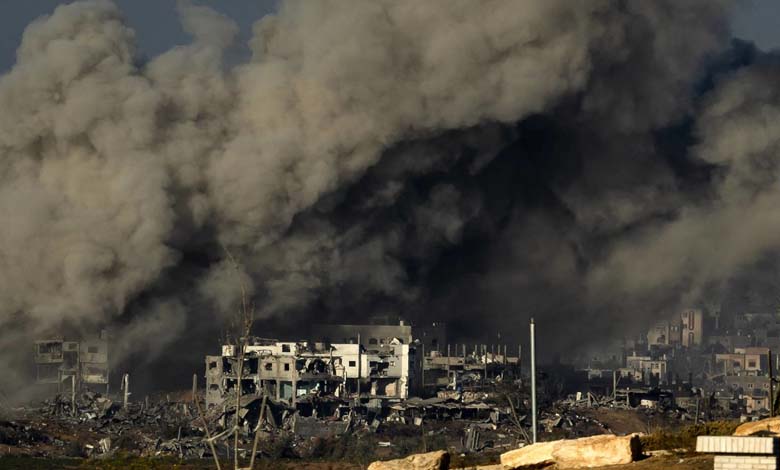Despite human losses, Israelis support continuing the war in Gaza
Israeli citizens express support for the ongoing war in Gaza despite the human casualties. Many Israelis affirm that the October 7th attack has revived a sense of existential threat experienced by the Hebrew state in the past, particularly during the surprise Arab attack in 1973

The majority of Israelis endorse the current conflict in Gaza, disregarding the field developments and the increasing loss of soldiers in confrontations with Hamas.
On Wednesday, Israeli citizens stated that the army should not retreat from its continuous assault to defeat Hamas, despite the United Nations General Assembly’s call for a ceasefire. This sentiment persists even as casualties among Israeli forces rise, and the number of Palestinian deaths in Gaza continues to increase.
The Israeli army experienced one of its bloodiest days on Tuesday in the ongoing Gaza war, with a senior officer and ten soldiers killed, bringing the death toll to 115, nearly twice the number during the coastal clashes nine years ago. After destroying a significant part of the region and with worsening conditions, along with the death of over 18,500 Palestinians in the Israeli aerial and ground offensive, U.S. President Joe Biden stated that Israel’s “indiscriminate” bombing of civilians in Gaza is eroding international support.
Recent polls overwhelmingly indicate support for the war despite the rising human cost. Six Israelis emphasized on Wednesday that now is not the time to retreat, regardless of the diminishing global sympathy evident in the United Nations’ decision on Tuesday.
Political scientist Tamar Herman, from the Israeli Democracy Institute conducting regular opinion polls on the war, stated that Hamas‘s killing of around 1,200 people, mostly civilians, on October 7th, revived the fear Israel experienced in 1973. She added, “People feel that this poses a threat to Israel’s existence,” noting that people are willing to accept more soldier casualties.
Retired Ben Zion Levinger, speaking in Jerusalem, argued that Israel‘s enemies would interpret any pause in pursuing Hamas as a sign of weakness. He added, as a former information technology professional, “If we don’t continue this battle to the end, tomorrow morning we will fight battles in the north, east, south, and perhaps Iran. Therefore, we have no choice.”
Chairman of the Knesset Foreign Affairs and Defense Committee Yuli Edelstein stated in an interview that despite the “terrible” cost, the goal of the military operation is the complete destruction of Hamas’s infrastructure in Gaza. Hamas contends that the soldiers’ deaths on Tuesday indicate that Israel will never achieve its war objectives and predicts that the longer Israel stays, the higher the toll and losses, ultimately leading to disappointment and defeat.
“After a week-long cessation of hostilities in November, more than three-quarters of Israelis believe that the attack should be resumed without any modification aimed at reducing losses among Palestinian civilians or alleviating international pressure, according to a survey conducted by the Israeli Democracy Institute.
Israeli media reports on the war do not focus on civilian losses in Gaza as much as international coverage. Herman said that while views on Palestinian casualties vary based on Israeli political leanings, some people feel that human losses are an acceptable price for future security.
She added, “There is a desire for revenge first, primarily on the right. On the left and center, they see it as a side effect (associated) with the achievements of the war… it is seen as collateral damage.”
Only 10 % of Israelis believe that the army uses excessive force, according to a survey conducted by Tel Aviv University in late October among 609 people, with a margin of error of 4.2 %.
Adam Savel, a resident of Jerusalem working in a non-profit academic institution, said that Israel is doing its utmost to avoid civilian casualties. He added, “It’s horrible that there are so many civilian casualties. But this is war, and this is what happens in war.”
In addition to arresting or killing Hamas leaders who planned the October 7th attack, the Israeli war aims to recover hostages held by militants and transferred to Gaza.
Israel says that at least 19 of the remaining hostages, totaling 135, have died, and two bodies were recovered this week. About 100 hostages were released during a one-week ceasefire in November.
Stickers with pictures of the hostages and the slogan “Bring them home” were placed on walls, bus stations, and public buildings throughout Israel.
In the past, Israelis have shown a willingness to make concessions for the release of hostages or to save the lives of their soldiers. However, the October 7th attack, the bloodiest incident in Israel’s 75-year history, has led to a hardening of opinions.
It is not surprising, given the unstable situation, that opinion polls show Israelis are unsure of the long-term solution. However, the survey conducted by the Israeli Democracy Institute indicates that more than 40 % of citizens believe Israel should seek the establishment of a separate Palestinian state after the war.
As an indication of the general mood, nearly 60 percent of Israelis, including 40 % of Arab Israelis, pointed out that destroying Hamas by any means possible is the most important goal of the war, according to a survey by Tel Aviv University. About a third said that bringing the hostages home is the primary goal.
Herman said, “At the moment, we haven’t achieved the first or the second goal… most people are willing to continue until at least one of the main goals is achieved.”












